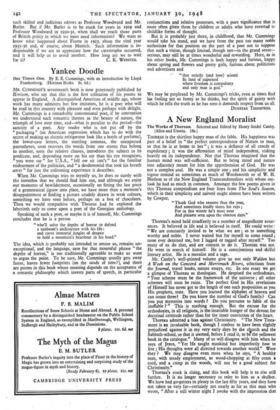Yankee Doodle
One Times One. By E. E. Cummings, with an introduction by Lloyd Frankenberg. (Horizon Books. 8s. 6d.)
MR. CUMMINGS'S seventeenth book is now generously published by Horizon, who say that this is the first collection of his poems to appear in England. A distinguished American of middle age, whose work has many admirers but few imitators, he is a poet who will be read in this country with pleasure and even perhaps with delight. Mr. Cummings is a remarkably conventional poet, if by convention we understand such romantic themes as the beauty of nature, the triumph of love over time, and—what is peculiar to the period—the sanctity of a poet. Any reader who is not put off by the " packaging " (an American expression which has to do with the secret of making an electric refrigerator look like a bottle of perfume), the lower-case letters, the startling commas, the unexpected parentheses, soon recovers the words from one stanza that belong to another, sorts the relative clauses, introduces the subject to its predicate, and, depending more on his ear than his eye recognises, " you were say " for U.S.A., " fell ow sit isnt's " for the familiar endearment of the politician, and " a desdemonial that took his breath .away " for just the enlivening experience it describes.
When Mr. Cummings tries to mystify us, he does so surely with the intention that we should find him out, and although we enjoy our moments of bewilderment, occasionally on fitting the last piece of a grammatical jigsaw into place, we have more than a moment's disappointment at finding a picture crudely drawn in weak colours, something we have seen before, perhaps on a box of chocolates. Then we would sympathise with Theseus had he explored the labyrinth only to come upon a poet of the Georgian anthology.
Speaking of such a poet, or maybe it is of himself, Mr. Cummings concludes that he is a person
" who'll solve the depths of horror to defend
a sunbeam's architecture with his life : and carve immortal jungles of despair
to hold a mountain's heartbeat in his hand."
The idea, which is probably not intended to amuse us, remains un- exceptional, and the language, save for that mournful phrase " the depths of horror," is too traditionally agreeable to make us want to argue the point. To be sure, Mr. Cummings usually gets away faster, leaves fewer footprints (on the sands of time?), and there are poems in this book whose meaning depends on the acceptance of a semantic philosophy which invests parts of speech, in particular
conjunctions and relative pronouns, with a pure significance that is more often given them by children or adults who have reverted to childlike forms of thought.
But it is probably just there, in childhood, that Mr. Cummings would take his stand, and we have from the past too many noble authorities for that position on the part of a poet not to suppose that such a vision, though limited, though not—in the grand sense— serious may still be at times wonderful and rewarding. Here' as in his other books, Mr. Cummings is both happy and furious, happy about spring and flowers and pretty girls, furious about politicians and advertisers and " that strictly (and how) scienti fic land of supernod
where freedom is compulsory and only man is god."
We may be perplexed by Mr. Cummings's tricks, even at times find his fooling not so funny as he thinks, but the spirit of gaiety with which he tells the truth as he has seen it demands respect from us all, DUNSTAN THOMPSON.


































 Previous page
Previous page